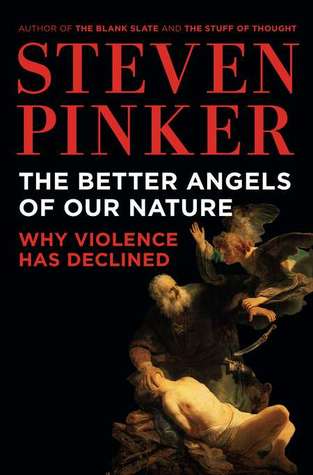The South's Long History of Violence
Why has the South had such a long history of violence? The most sweeping answer is that the civilizing mission of government never penetrated the American South as deeply as it had the Northeast, to say nothing of Europe. The historian Pieter Spierenburg has provocatively suggested that “democracy came too early” to America.85 In Europe, first the state disarmed the people and claimed a monopoly on violence, then the people took over the apparatus of the state. In America, the people took over the state before it had forced them to lay down their arms—which, as the Second Amendment famously affirms, they reserve the right to keep and bear. In other words Americans, and especially Americans in the South and West, never fully signed on to a social contract that would vest the government with a monopoly on the legitimate use of force. In much of American history, legitimate force was also wielded by posses, vigilantes, lynch mobs, company police, detective agencies, and Pinkertons, and even more often kept as a prerogative of the individual.
This power sharing, historians have noted, has always been sacred in the South. As Eric Monkkonen puts it, in the 19th century “the South had a deliberately weak state, eschewing things such as penitentiaries in favor of local, personal violence.”86 Homicides were treated lightly if the killing was deemed “reasonable,” and “most killings . . . in the rural South were reasonable, in the sense that the victim had not done everything possible to escape from the killer, that the killing resulted from a personal dispute, or because the killer and victim were the kinds of people who kill each other.”
The South’s reliance on self-help justice has long been a part of its mythology. It was instilled early in life, such as in the maternal advice given to the young Andrew Jackson (the dueling president who claimed to rattle with bullets when he walked): “Never . . . sue anyone for slander or assault or battery; always settle those cases yourself.”88 It was flaunted by pugnacious icons of the mountainous South like Daniel Boone and Davy Crockett, the “King of the Wild Frontier.” It fueled the war between the prototypical feuding families, the Hatfields and McCoys of the Kentucky–West Virginia backcountry. And it not only swelled the homicide statistics for as long as they have been recorded, but has left its mark on the southern psyche today.
Notes:
Folksonomies: violence vigilantism
Taxonomies:
/law, govt and politics/government (0.521381)
/science/social science/history (0.446564)
/technology and computing/software/net conferencing (0.445828)
Keywords:
Amendment famously affirms (0.920359 (neutral:0.000000)), historian Pieter Spierenburg (0.899076 (neutral:0.000000)), prototypical feuding families (0.890901 (negative:-0.405906)), deliberately weak state (0.879727 (neutral:0.000000)), young Andrew Jackson (0.858688 (neutral:0.000000)), Kentucky–West Virginia backcountry (0.852710 (neutral:0.000000)), South (0.848333 (negative:-0.325873)), civilizing mission (0.758208 (neutral:0.000000)), American South (0.756564 (neutral:0.000000)), long history (0.735387 (negative:-0.587115)), sweeping answer (0.734168 (neutral:0.000000)), mountainous South (0.729867 (neutral:0.000000)), legitimate force (0.721471 (positive:0.268025)), rural South (0.719837 (neutral:0.000000)), pugnacious icons (0.718028 (neutral:0.000000)), lynch mobs (0.712808 (negative:-0.270829)), America.85 In Europe (0.710381 (neutral:0.000000)), Davy Crockett (0.708465 (neutral:0.000000)), words Americans (0.706991 (neutral:0.000000)), social contract (0.705353 (neutral:0.000000)), maternal advice (0.701800 (neutral:0.000000)), company police (0.701622 (neutral:0.000000)), detective agencies (0.700719 (positive:0.274541)), dueling president (0.699066 (negative:-0.224824)), American history (0.698962 (neutral:0.000000)), power sharing (0.698615 (positive:0.437523)), Eric Monkkonen (0.695924 (neutral:0.000000)), homicide statistics (0.695370 (negative:-0.294691)), southern psyche (0.695137 (negative:-0.504531)), Daniel Boone (0.693993 (neutral:0.000000))
Entities:
America:Continent (0.914958 (negative:-0.348564)), Europe:Continent (0.615438 (negative:-0.309694)), Northeast:Region (0.529932 (neutral:0.000000)), Andrew Jackson:Person (0.502664 (negative:-0.224824)), Pieter Spierenburg:Person (0.493614 (neutral:0.000000)), Second Amendment:FieldTerminology (0.490137 (neutral:0.000000)), Davy Crockett:Person (0.448523 (neutral:0.000000)), Daniel Boone:Person (0.439087 (neutral:0.000000)), Eric Monkkonen:Person (0.436432 (positive:0.281567)), lynch:Person (0.427486 (negative:-0.270829)), assault:Crime (0.414331 (negative:-0.606785)), president:JobTitle (0.406717 (negative:-0.224824)), Pinkertons:Person (0.401458 (neutral:0.000000)), Virginia:StateOrCounty (0.388925 (neutral:0.000000))
Concepts:
Southern United States (0.957129): dbpedia | freebase
Tennessee (0.899486): website | dbpedia | freebase | opencyc | yago
United States (0.770994): website | dbpedia | ciaFactbook | freebase | opencyc | yago
Davy Crockett (0.727521): website | dbpedia | freebase | yago
Lynching (0.698065): dbpedia | freebase
American Civil War (0.607505): dbpedia | freebase | yago
Florida (0.576400): geo | website | dbpedia | freebase | opencyc | yago
North Carolina (0.559384): website | dbpedia | freebase | opencyc | yago | geonames





